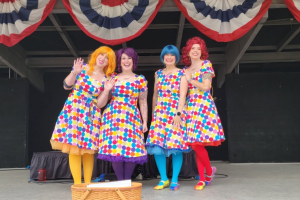Musicians revisit Johnny Cash’s ‘Bitter Tears’
Published 2:19 pm Friday, August 22, 2014
On the heels of two of the biggest hits of his career in “Ring of Fire” and “Understand Your Man,” Johnny Cash was a hot commodity in 1964 when he gave his record company an ambitious new concept album, “Bitter Tears: Ballads of the American Indian.”
But the label shied away because of its potentially controversial subject matter, prompting Cash to take matters into his own hands to promote a project that he consistently cited as one of the proudest moments of his storied career.
A half-century later, “Bitter Tears” is getting another shot at recognition through “Look Again to the Wind: Johnny Cash’s Bitter Tears Revisited,” a new version recorded by a group of Cash’s friends, including Kris Kristofferson and Emmylou Harris, as well as singer-songwriters Steve Earle, Gillian Welch and David Rawlings, and Native American musician Bill Miller.
For producer and roots music specialist Joe Henry, “Bitter Tears” isn’t just a high watermark in American popular music, but one whose exploration of the injustices suffered by Native Americans for much of the past four centuries opened “a window into a particular part of our history that remains open and unresolved.”
“You have to understand, Johnny Cash was my first conscious musical hero of my lifetime,” Henry said. “My consciousness of Johnny Cash and my debt to him is tremendous and far-reaching.”
But as much as Henry admired Cash, he acknowledged that “I did not understand the significance of the line he drew with his own record label and the music industry at large in 1964, when the record was released.”
That refers to the struggle Cash had with Columbia Records executives to promote “Bitter Tears” at a time when country music – especially country radio – had little interest in politically conscious music. Among the toughest sells was “The Ballad of Ira Hayes,” songwriter Peter La Farge’s castigation of the disrespect the Native American Hayes received upon returning home from serving in the military during World War II and being part of the team that raised the flag at Iwo Jima, Japan.
“This is not something the record company wanted because the record company wanted hits – and John wanted to make music that he felt mattered, especially concept albums like ‘Bitter Tears’ and ‘Ride This Train,’” said Robert Hilburn, author of the 2013 biography “Johnny Cash: The Life” and former pop music critic for The Times.
“One of his greatest gifts was the way he empathized with people in need, especially underdogs, because he had been an underdog himself, coming from a poor dirt farm in Arkansas,” Hilburn said. “But that empathy stretched from convicts – hence the ‘Folsom Prison’ album – to struggling workers, to what he sensed was the greatest underdog of all, the Native American.
“He felt so strongly about the country’s mistreatment of Native Americans that he took out a full page ad in Billboard, the music trade publication, lashing out at pop and country disc jockeys for not playing the single ‘The Ballad of Ira Hayes,’” Hilburn added.
Cash went a step further, paying an independent record promotion company to push the “Ira Hayes” single to those DJs (including a personal note reading, “I really need your help on this one, pal,” Hilburn noted). The efforts paid off, and the song reached No. 3 on the Billboard Country Singles chart in the summer of ‘64.
“John and I had the same social conscience, I think,” Kristofferson told The Times in a separate interview. Kristofferson performs “The Ballad of Ira Hayes” on the new version.
“I always respected that song because when he did it, it wasn’t so popular,” he said. “But John always did what he thought was right, and I thought that was a pretty great way to go through life…. John was one of the first celebrities who took up the Native American cause. He had so much respect that I think it made a big impression on people.”
It certainly did on Miller, the three-time Grammy Award-winning Native American singer and songwriter who performs the title track, the only song that did not appear on the original album, but was also written by La Farge, the New York folk artist who wrote the majority of the album’s original songs.
Miller was 9 when “Bitter Tears” was released, but he vividly remembers its effect on the Stockbridge-Munsee Mohican reservation where he grew up in Wisconsin.
“It was unforgettable,” he said. “In 1964, not only did I tune in Feb. 9 to watch the Beatles on Ed Sullivan, but that was the year my dad bought me ‘Bitter Tears.’ So I’ve had that record since I was a little kid. …Whenever we would get on buses and go off the reservation, there would be kids laughing and calling you names. There was a lot of hard racial stuff going on up there.
“So at the same time you’d hear people talk about the Beatles and the music representing their culture, which I loved, we had this album that spoke about our culture,” Miller said. “I didn’t play it for everybody, but when I listened to it I felt lifted, and so happy, because I was such a Johnny Cash fan.”
For Cash, “Bitter Tears” wasn’t a narrowly focused bromide against the unfair treatment of Native Americans, but part of the broader political conversation that was front and center in the 1960s.
“My father didn’t only have sympathy for the Native Americans’ plight and needs; he considered himself to be one of them,” said John Carter Cash, Cash’s son from his marriage to June Carter, referring to his father’s belief at the time that he was part Cherokee, which turned out not to be the case. “His heart never felt so deeply as when he recorded ‘Bitter Tears’ and no greater afterward.”
Added producer Henry: “He was bewildered why more people couldn’t connect the dots. He thought the civil rights movement was not strictly an African American issue, it’s a civil rights issue, and why aren’t we considering this all under the same banner?
“At the end of the day,” Henry said, “I would say my great hope is that people will not only be moved by the music as song, but that they will really be reminded that this issue is not ancient history. Things are not better now than they were 50 years ago for Native Americans.
“We’ve not made strides like we’ve made elsewhere, and we shouldn’t all be so OK with that. There’s a relevant, and active conversation that needs to be engaged.”




